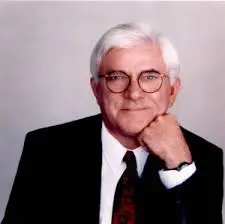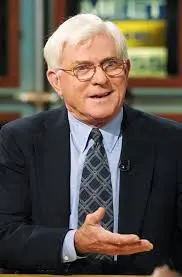Phil Donahue was born as Phillip John Donahue in Cleveland to parents Phillip and Catherine McClory. His father was a furniture salesman and a shoe clerk at a department store. Raised in the strong influence of Roman Catholicism, Phil attended St. Edward High, an all-boys preparatory school in Lakewood, before moving on to the University of Notre Dame.
His early life was shaped by the religion of his family, which he later criticized as a negative influence that was both sexist and racist. Despite this, Phil’s charm and inquisitive nature led him to broadcasting. He started as a news reader and street reporter at local stations in Ohio, Indiana, and Michigan. His early career as a dollar-an-hour schlepper was a grind, but it set the foundation for the man who would reinvent television.
The Birth of the Phil Donahue Show
Phil Donahue made his debut in 1967 with the Phil Donahue Show on WLWD-TV in Dayton, Ohio. At just 29 years old, Phil began what would become a 29-year syndicated run, during which he was the unchallenged king of daytime talk television. Unlike other shows with the typical trappings of a monologue, a couch, a sidekick, and a band, Phil focused on the guests and topics that mattered.
The Phil Donahue Show wasn’t just about light-hearted entertainment; it brought audiences into the conversation, making them feel seen and heard. Phil was known for his unique practice of stalking the aisles with a microphone in hand, engaging directly with his audiences. This format allowed the show to flourish, addressing hot topics and even controversial subjects like human rights, international relations, and the AIDS epidemic.
Controversy and Criticism
Throughout the years, Phil Donahue became known for his controversial approach. He hosted figures like Madalyn Murray O’Hair, who was known as America’s most prominent atheist. He tackled issues like abortion, reverse vasectomy, tubal ligation, and even broadcasted from a maximum-security prison, questioning the penal system. His episodes also delved into the Chernobyl nuclear accident in Ukraine and discussed safe-sex practices during the height of the AIDS epidemic.
Phil also wasn’t afraid to touch on more lowbrow topics, featuring male strippers, orgies, and discussions on sexual pleasure. These topics drew both applause and criticism. His feminist views earned him the ire of critics, who saw him as a self-satisfied television star, while his admirers, including Nora Ephron, found him to be refreshingly inquisitive and open-minded.
The Impact on Television and Culture
Phil Donahue’s impact on television cannot be overstated. He brought a democratic approach to talk television, allowing audiences to interact and engage with guests on a variety of topics. His show became a platform for discussing both lofty discourse and everyday issues.

He was also known for his provocative questions, whether it was about leukemia and a dying child, or the real issues facing women and adults at the time. His show appealed to housewives and everyday people, making them feel like their voices mattered.
Phil’s influence extended beyond television, touching on major cultural shifts in America. His show featured feminist pioneers, Hollywood stars, consumer advocates, and even presidential candidates. At its peak, the Phil Donahue Show had viewership of eight million and won 20 Daytime Emmy Awards, including a lifetime achievement Emmy.
The Decline and Legacy
Despite his success, the mid-1980s saw the rise of other daytime talk shows like Oprah Winfrey, Jerry Springer, Geraldo Rivera, and Sally Jessy Raphael. Phil Donahue found himself struggling with low ratings as the Nielsen ratings favored more sensational shows. By 1996, Phil finally quits his long-running show.
However, Phil Donahue did not fade away quietly. In 2002, he attempted a comeback with a nightly program on MSNBC. The show, though short-lived, marked his continued relevance in a changing media landscape. He also co-directed the antiwar documentary “Body of War” in 2007, which further solidified his position as a hero to many.
Personal Life and Final Years
Phil Donahue was not just a television star; he was also a man with a rich personal life. He married Margaret Mary Cooney in 1958, and they had four boys and a girl before divorcing in 1977. Later, in 1980, Phil married Marlo Thomas, the star of That Girl and a feminist icon. Their marriage was one of mutual respect and support, with Phil embracing Marlo’s feminist values.
Tragedy struck when Phil’s sister, Kathy Taube, died from an aortic aneurysm at 51 in 2014. Despite these personal losses, Phil continued to impact others through his work and life.
In his later years, Phil Donahue lived a quiet life on the Upper East Side of Manhattan. His death at 88 was confirmed by Susan Arons, a representative of his family. Phil left behind a legacy that will not soon be forgotten.
Conclusion
Phil Donahue was a talk show host who reinvented television by making it a democratic platform where audiences and guests alike could be seen and heard. His willingness to tackle both lofty and lowbrow topics made him a pioneer in the field. Though his death marked the end of an era, his influence will continue to flourish as a testament to what talk television can achieve.
If you love staying updated with the latest in fashion, travel, tech, sports, and gadgets, be sure to follow new feed nation. Don’t miss out on any updates—get the freshest news and trends delivered right to you!





























